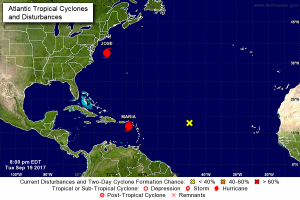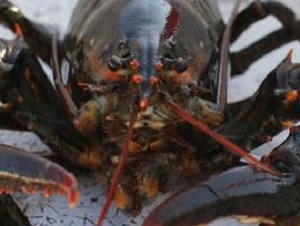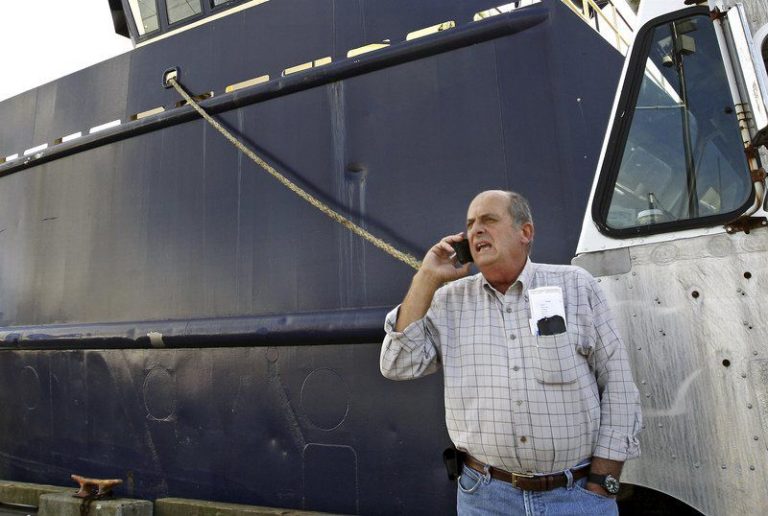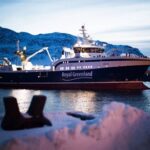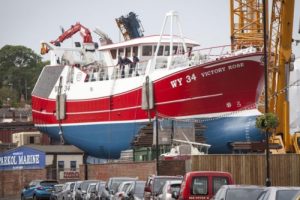Category Archives: South Atlantic
Athearn Marine Agency Boat of the Week: 76′ Steel Dragger/Federal Permits, Detroit 12-V-71
 To review specifications, information, and 28 photos’, >click here<, To see all the boats in this series >click here< 13:09
To review specifications, information, and 28 photos’, >click here<, To see all the boats in this series >click here< 13:09
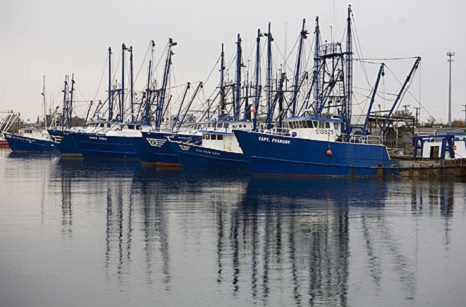
Untangling catch shares with Lee van der Voo – Catch shares have changed fisheries and fishing communities across the U.S.
I recently saw some great reporting by the New Bedford Light and ProPublica about how the billionaire Dutch family that owns Blue Harvest Fisheries has emerged as a force in groundfish fishing off the coast of Massachusetts. These are very wealthy, powerful equity groups and corporations that are acquiring access to the fisheries and passing the cost of owning them and fishing them onto fishermen. There’s been profound disenfranchisement of people who used to have a more personal stake in fishing and seafood. Everyone from indigenous communities in Southwest Alaska whose history with halibut goes back to the beginning of time to small-boat, family operations around the United States everywhere have been losing access. Whole communities have fallen apart over that. >click to read< 08:15

Personal Locator Beacons improve the chance of rescue at sea
A PLB is a personal electronic device that transmits a survivor’s location on or in the water to the Search and Rescue Satellite-Aided Tracking system during an emergency. It’s designed to be carried in a person’s life vest (or elsewhere on their body) and manually activated when the wearer is in distress. PLBs continuously update a survivor’s location. New Year’s Eve is a time of celebration and remembrance. Three years ago, on December 31, 2019, as the new year was being rung in across the lower 48 states, a tragedy was playing out in icy Alaskan waters. F/V Scandies Rose, with seven crew members aboard, capsized and sank before reaching safety. >click to read< Then, there is survivor John Aldridge, a crewmember of the 44-foot lobster  vessel Anna Mary was last seen aboard the boat during his watch relief at 9 p.m., Tuesday, while the vessel was underway off Montauk, N.Y. How many times have you read of or heard of a fisherman going overboard, only to watch an unsuccessful chain of events involving fruitless search and rescue operations to see them become possible recovery operations, and predictably, abandoned after a period of time, dictated by estimates of rate of survival and sea conditions? Way too many.
vessel Anna Mary was last seen aboard the boat during his watch relief at 9 p.m., Tuesday, while the vessel was underway off Montauk, N.Y. How many times have you read of or heard of a fisherman going overboard, only to watch an unsuccessful chain of events involving fruitless search and rescue operations to see them become possible recovery operations, and predictably, abandoned after a period of time, dictated by estimates of rate of survival and sea conditions? Way too many.

Green Groups Ignore Genuine Risks To Whales From Offshore Wind Farms
Environmentalists want to crack down on the Maine lobster industry in the name of protecting endangered whales, but they turn a blind eye to the greater threat to whales from proposed offshore wind farms. The irony is almost as delicious as the lobster dinners at stake. Green groups such as the Center for Biological Diversity and Defenders of Wildlife routinely target commercial fishing by claiming that it causes ancillary harm to marine species protected under the Endangered Species Act and other federal laws. This includes the North Atlantic right whale, whose population of only 350 or so migrates up and down the Atlantic Coast and can cross prime lobster territory off New England. >click to read< 11:52
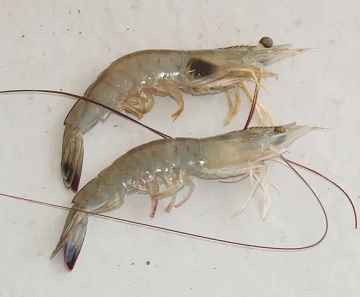
Black Gill: Shrimpers and scientists collaborate to study parasite
Georgia’s shrimpers are already facing plenty of challenges like high gas prices, inflation and international competition. But climate change is exacerbating a new problem: black gill, a parasite that is decreasing shrimp populations and is worsening with rising ocean temperatures. On Dec. 15, the University of Georgia’s Skidaway Institute of Oceanography invited shrimpers, researchers and other local stakeholders aboard the R/V Savannah to collect samples in the Wassaw Sound and discuss the current research and on-the-water observations of black gill. Black gill is a parasite that lodges itself into shrimps’ gills and feeds on that tissue. It’s a ciliate, a single-celled organism. It gets its name from the shrimp’s immune response to the invader, which turns the gills black as the shrimp’s body tries to fight off the intruder. Photos, >click to read< 10:37
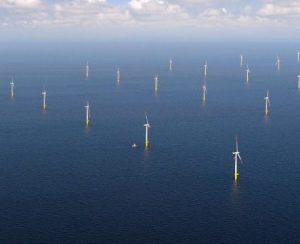
Opinion: Who owns the oceans?
There is a question that has been asked in our household for years. For us, it’s a personal question. Generations of family fisherman have been affected by the decisions of others, some known and many invisible. We have had to sit on the sidelines watching the demise of our industry while power brokers, politicians, and the money hungry chart the course when we are not even invited to the table. Now we find ourselves watching the final chapters play out, knowing that we don’t even have a role. The high jacking of our oceans didn’t happen overnight. The slow, methodical process has lined the pockets of the politicians at every level of government. Working in conjunction with private industry and environmentalists they have driven our beloved industry past the brink and left fisherman with no place left to fish. >click to read< 09:59
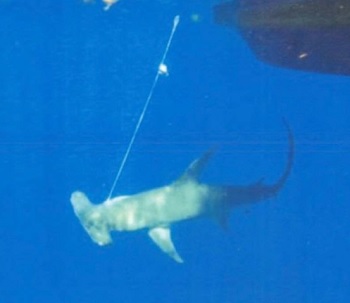
Two shark divers freed 19 sharks from a commercial longline. They’re facing five years in prison
The men, boat captain John R. Moore Jr., 56, and mate Tanner Mansell, 29, gathered up the three miles of line and freed 19 sharks and a Goliath grouper, a state-protected species. The three-hour effort was done with the help of their charter passengers, telling them the line was an abandoned “ghost set” of line, U.S. Attorney’s Office prosecutors said. Two years later, a grand jury indicted Moore and Mansell of theft of commercial fishing gear in federal waters. A jury convicted the men last week, and they now face five years each in federal prison. The line, prosecutors said, belonged to a commercial fishing operator that was licensed to catch all the species of shark that were hooked that day. >click to read< 07:48

BOEM and NOAA announce joint strategy for fisheries surveys
BOEM and NOAA Fisheries are announcing a joint strategy to address potential impacts of offshore wind energy development on NOAA Fisheries’ scientific surveys. The Federal Survey Mitigation Strategy underscores the agencies’ shared commitment to the Biden-Harris Administration’s clean energy goals of responsibly advancing offshore wind energy production while protecting biodiversity and promoting ocean co-use. “This joint strategy will help ensure the quality of NOAA’s fisheries surveys and data are maintained while the nation develops offshore wind energy,” said Janet Coit, assistant administrator for NOAA Fisheries,,, >click to read< 08:57
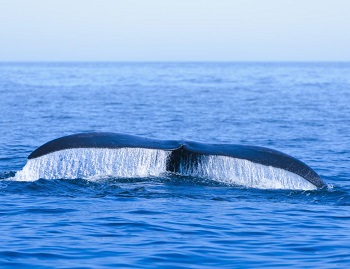
Wind Projects Off New England Put Endangered Right Whales at Risk, Warns NOAA Scientist
Planned wind projects off the New England coast threaten to harm the region’s dwindling population of endangered right whales, according to a US government marine scientist. The warning from a top National Oceanic and Atmospheric Administration official, obtained by Bloomberg under a Freedom of Information Act request, underscores the potential legal and environmental perils of offshore wind development along the coast. President Joe Biden has a goal of deploying 30 gigawatts of offshore wind within the decade. Both initial construction of wind projects and decades of expected operation threaten to imperil right whales in southern New England waters, Sean Hayes, chief of the protected species branch at NOAA’s National Northeast Fisheries Science Center, said in a May 13 letter to Interior Department officials. >click to read< 11:26
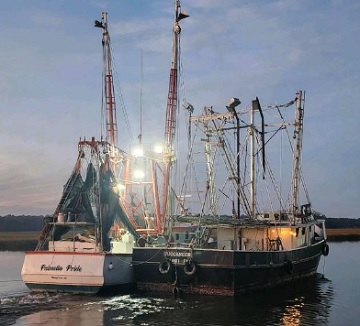
Old Port Royal shrimp boat is sunk off Hilton Head Island. It’s now being put to good use
A 70-foot shrimp boat, once docked in the town of Port Royal, has joined New York City subway cars and other unusual materials that make up a man-made reef off of South Carolina’s Hilton Head Island, where black sea bass, grouper and barracuda and other fish hang out. On Oct. 25, the Palmetto Pride, a shrimp boat with Beaufort-based Sea Eagle Market, captained by Cameron Reaves, towed the Buccaneer to Betsy Ross Reef, 16 miles east of Hilton Head, where it was sunk the next day, said Craig Reaves, Cameron’s brother. Craig Reeves sees it as a “win win,” he said, because the older shrimp boat will benefit both the environment in its new life and Port Royal’s efforts to remove old boats from its water prepares as it prepares to build a new shrimp dock and processing facility. Video, >click to read< 09:05
Athearn Marine Agency Boat of the Week: 85′ Steel Shrimp Trawler, Caterpillar 3412
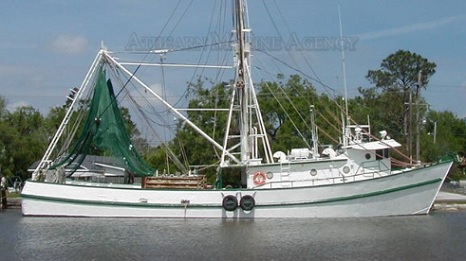 To review specifications, information, and 12 photos’, >click here<, To see all the boats in this series >click here< 10:56
To review specifications, information, and 12 photos’, >click here<, To see all the boats in this series >click here< 10:56
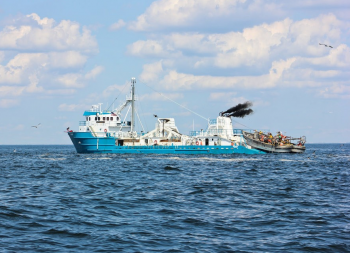
Menhaden Harvest Increase Approved as Anglers Petition to Close Bay Fishery
East Coast fishery managers have approved increasing commercial harvests of Atlantic menhaden from Maine to Florida. The Atlantic States Marine Fisheries Commission (ASMFC), which regulates near-shore harvests of migratory fish, voted Wednesday to set a new ceiling on the coastwide menhaden catch of 233,550 metric tons, a 20 percent increase over the current quota. The longstanding cap on harvest in the Chesapeake Bay remains unchanged, at 51,000 metric tons. But conservationists and sports anglers continue to worry about the impact to the Bay from large-scale fishing of menhaden near its mouth. >click to read< 13:54

Draft North Atlantic Right Whale and Offshore Wind Strategy Announced
As the Bureau of Ocean Energy Management (BOEM) has ramped up offshore wind development to meet the Biden-Harris administration’s goal of generating 30 gigawatts of offshore wind by 2030, the question of how the expansion of offshore wind energy could affect the critically endangered North Atlantic right whale (NARW) has come under close review. To help address this question and support the recovery of endangered NARW and the responsible development of offshore wind energy, BOEM and the National Oceanic and Atmospheric Administration’s National Marine Fisheries Service (NOAA Fisheries) developed a joint Draft North Atlantic Right Whale and Offshore Wind Strategy (the Draft Strategy). >click to read< 11:29
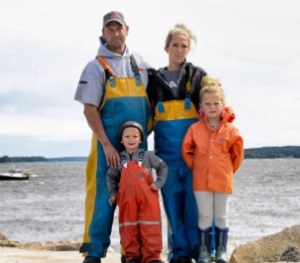
Maine Lobstermen’s Association Files Opening Brief in Appeal of Burdensome Federal Regulations
The fight to save Maine’s iconic lobster industry has reached the U.S. Court of Appeals for the D.C. Circuit, as the Maine Lobstermen’s Association (MLA) filed its opening brief in a challenge to the federal regulations poised to crush workaday fishermen. The National Marine Fisheries Service (NMFS) is implementing a rule that requires fishermen to reduce the risk of right whale entanglement with lobster gear by 98 percent. The overwhelming majority of Maine lobstermen are unable to afford compliance with the draconian risk reduction plan, that according to the NMFS, will not even recover the whale population. The plan will likely result in a corporate takeover of the remnants of Maine’s fishery, destroying the culture, charm, and most importantly, the families and communities who have responsibly fished Maine lobsters for generations. >click to read the press release< 11:38
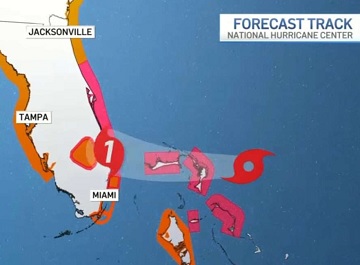
Nicole Expected to Become Hurricane Wednesday Before Impacting Florida’s East Coast
Tropical Storm Nicole is expected to become a Category 1 hurricane Wednesday as it moves toward the east coast of Florida, forecasters said. Nicole had maximum sustained winds of 70 miles per hour and was moving west-southwest at 13 mph about 270 miles east of West Palm Beach, according to the latest advisory from the National Hurricane Center in Miami. Nicole is forecast to be at hurricane intensity by Wednesday or Wednesday night while it is moving near or over the northwestern Bahamas, the hurricane center said. >click to read< 06:37

Man, tired of living in U.S., steals boat to go back to Cuba, gets arrested on way
A 30-year-old Miami man was jailed in the Florida Keys after authorities say his plan to steal a commercial fishing boat in order to head back to Cuba hit a serious snag Monday. According to the Monroe County Sheriff’s Office, a Marathon man reported that his 40-foot fishing boat was stolen that morning and said one of his former employees, Cristian Torres Perez, had recently quit “and had been talking about returning to Cuba as he disliked living in the U.S.” >click to read< 12:10

Maine lobster group backs new speed limit on ships to protect whales
A proposal to expand speed limits along the East Coast might have little impact on vessels off Maine and is not directly linked to two lawsuits over pending federal regulations for the state’s lobster fishery. Still, the groups involved in that litigation recently weighed in on the speeding proposal, which is part of broader efforts to save right whales from extinction. The Maine Lobstermen’s Association and four conservation groups supported the stricter limits but took issue with other aspects of the rules and reiterated the priorities that have driven their court battles. >click to read< 09:31
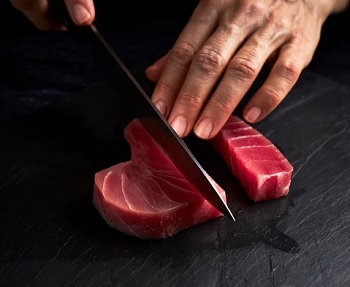
Why Bluefin Tuna Is Considered the Best Tuna Variety by Many
In case you haven’t been acquainted, meet bluefin tuna, the luxurious seafood superstar. According to Fishing Booker, the bluefin is prized for its delicious meat, and it comes with a price tag of royal proportions. Until the 1970s, says The New Yorker, fishmongers didn’t so much as bat an eye at the good old bluefin, often selling the delicacy for less than one dollar per pound. Today, though, a single piece of bluefin sashimi at Nobu Chicago runs for $20, and it gets even pricier. >click to read< scroll down for 15 ways to cook fish! 18:29

Fishermen fight back on imported shrimp
A big part of Louisiana is the shrimp industry, but the Louisiana Shrimp Taskforce worries they will not survive due to the overwhelming amount of imports. “We are Louisiana, I don’t care how you look at it. When you talk about Louisiana, there’s only a couple of things you talk about, and fishing is one of them. You don’t want to come to Louisiana and eat Indonesia shrimp, you want to eat Louisiana shrimp,” says Acy Cooper chairman of the Louisiana Shrimp Taskforce. Cooper says they have gotten the numbers, showing the United States imported billons of shrimp from foreign countries like Indonesia, Peru, Thailand and Vietnam. Video, >click to read< 11:44
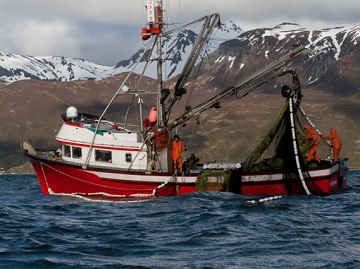
Coast Guard: Additional Actions Needed to Improve Commercial Fishing Vessel Safety Efforts
To improve safety in the extremely dangerous commercial fishing industry, Coast Guard examines fishing vessels’ documents and safety equipment, and conducts outreach to fishers, among other efforts. But, Coast Guard hasn’t fully implemented 17 of 22 statutory requirements to improve commercial fishing vessel safety. For example, Coast Guard hasn’t developed a training program for commercial fishers or re-established an advisory committee on industry safety issues. In addition, Coast Guard doesn’t have a detailed plan to guide their efforts to fully implement the outstanding statutory requirements. Our recommendations address this and more. >click to read< 09:12
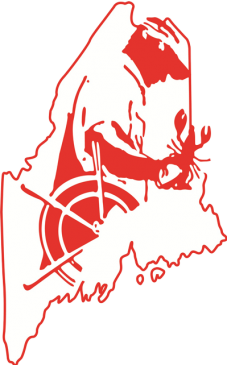
Maine Lobstermen’s Association Assails Inadequate and Inequitable Vessel Speed Rule
KENNEBUNK, Maine – (November 1, 2022), In official comments submitted this week, the Maine Lobstermen’s Association (MLA) called on the federal government to apply the law fairly as it develops new rules that would protect North Atlantic right whales from vessel strikes – which are known to have killed multiple endangered whales in U.S. waters in recent years. The National Oceanic and Atmospheric Administration (NOAA) has proposed expanding the current mandatory seasonal speed restrictions of 10 knots or less in designated areas of the ocean and require most vessels measuring 35 to 65 feet in length to comply. Though MLA supports the proposed measures in the speed rule, it objects to NOAA’s continuing pattern of over-regulating U.S. commercial fisheries and under-regulating other sectors, leaving endangered whales inadequately protected from deadly human interactions. >click to read<07:53
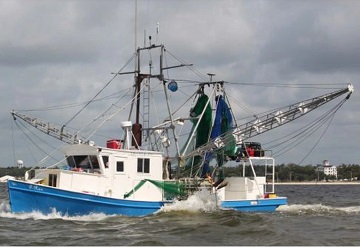
USDA to buy $25 million in shrimp
The United States Department of Agriculture is purchasing $25 million in shrimp caught in the Gulf of Mexico and South Atlantic. The purchase will provide relief to Louisiana’s shrimp industry, according to Congressman Garret Graves’ office. The USDA will use the shrimp for food nutrition assistance programs, according to Congressman Clay Higgins’ office. The USDA made similar purchases of shrimp in 2020 and 2021. >click to read< Southern Shrimp Alliance Applauds Announcement of $25 Million in Additional USDA Section 32 Purchases of Shrimp – >click to read< 15:18

The fight to protect right whale, lobsters roils Maine politics
In a state where few things matter more than lobster, it’s no surprise that Mainers are getting a hefty portion of crustacean politics as part of the campaigning for the 2022 midterm elections. What is surprising, however, is the high level of anger and frustration pointed squarely at Washington regulators, with many arguing that NOAA’s new rules are unfair and will hit the prized lobster industry far too hard. Rule backers say they’ll help protect a dwindling population of whales that’s at grave risk from fishing gear. “The men and women who make up Maine’s iconic lobster fishery are facing a terrible crisis, a crisis not of their making, a crisis that is due to this administration’s onerous regulations,” photos, >click to read< 12:11

North Atlantic right whale’s decline slows, but population falls again
The decline of an endangered species of whale slowed last year, as it lost about 2% of its population, but scientists warn the animal still faces existential threats and is losing breeding females too fast. The North Atlantic right whale’s population was more than 480 in 2010 and fell by more than 25% over the following decade. The North Atlantic Right Whale Consortium, a group of scientists, government officials and industry members, said Monday that the population fell to an estimated 340 last year. That is a decline of eight animals from the previous year, when the population was initially thought to be even fewer. >click to read< Meanwhile in Canada, no right whale deaths have been reported in Canadian waters in three years. >click to read< 08:02
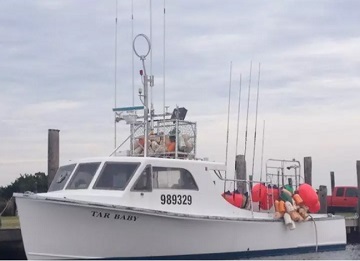
Mystery of the disappearing mahi-mahi divides fishermen
At a recent meeting of federal regulators in the Florida Keys, local fishermen raised the alarm that one of the most popular fish they go after – the dolphinfish or mahi-mahi – is fast disappearing from local waters. But industry regulators and the commercial fishing boats, say the plight of the charter boats is more complicated than that. Commercial “long line” fishing is not permitted off the Florida coast and federal regulations allocate the vast majority of the 24.5 million pounds of mahi-mahi allowed annually to the charter boats and their recreational rod-and-reel customers. They blame the larger commercial fishing vessels ,,, Photos, >click to read< 17:19
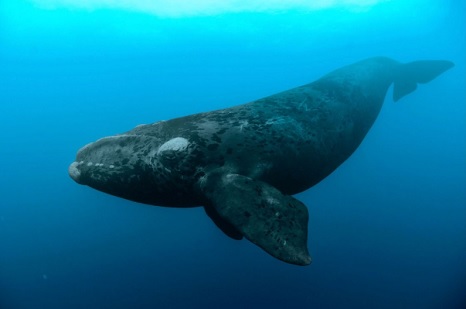
No Fluke: Locals Fight Offshore Wind Power Project That Threatens Mass Whale Wipeout
If the wind industry gets its way, it’s curtains for the already endangered Atlantic Right Whale. Taking giant industrial wind turbines offshore threatens whales of all shapes and sizes, including the Atlantic Right Whale. Whales already have plenty of offshore industrial activity to contend with. However, where oil and gas extraction, international shipping, and commercial fishing have obvious embodied economic benefits, the only economic benefit derived from wind power is the subsidies it attracts. No subsidies. No wind power. It’s that simple. >click to read< 12:55

Commercial fishermen accused of raiding fellow fisherman’s lobster traps in the Keys
Three commercial fishermen were arrested this week after being accused of raiding another commercial angler’s traps and stealing at least one spiny lobster. Their arrest Tuesday came five days after plainclothes Florida Fish and Wildlife Conservation Commission officers said they observed them from land checking the other boat’s traps off Long Key and taking one lobster. Aniel Sanfiel Vallalonga De La Fe, 51, from Miami, Ricardo Daiz De La Cruz, 32, from Boca Raton, and Yumar Gonzalez Ruiz, 49, from Homestead, each face two counts each of felony trap tampering and one count each of theft of the contents of another harvester’s traps, a second-degree misdemeanor. >click to read< 10:32
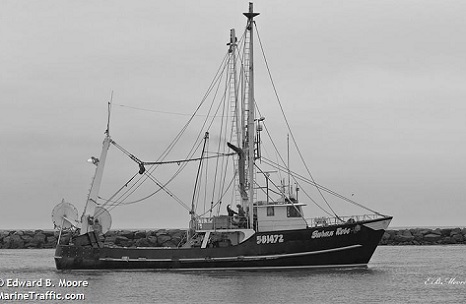
A good story about a good man – Legendary Captain Joe Rose
Captain Joe Rose of Beaufort is a rare breed of fisherman. He is one of the few remaining owner-operators in the Atlantic Coast fleet of ocean-going draggers that ply the waters from Cape Hatteras to the Grand Banks near Nova Scotia. He talks about underwater topography and place names unfamiliar to the average landlubber: Hudson Canyon. New York Gully. Monster Ledge. Baltimore Canyon. Closing in on his 72nd birthday, Captain Rose is hanging up his oilskins. He took his last trip before Christmas. He sold his 86 foot steel trawler Susan Rose to The Town Doc in Port Judith, Rhode Island, a wholesale seafood company whose motto is Holding Squid to a Higher Standard. >click to read< 09:23

New Hampshire fishermen worried about new guidelines to protect right whales
New Hampshire fishermen are raising concerns about additional restrictions they’ll be facing in order to protect the critically endangered right whale. The president of the New Hampshire Fish Council said guidelines are being worked out between the industry and National Marine Fisheries Service, but he said there has never been a recorded incident between a right whale and a New Hampshire fisherman. “It’s hard to swallow the fact that we never harmed a right whale, never entangled a right whale and yet we’ve got to meet all these guidelines,” said lobster fisherman Ward Byrne. video, >click to read/watch<
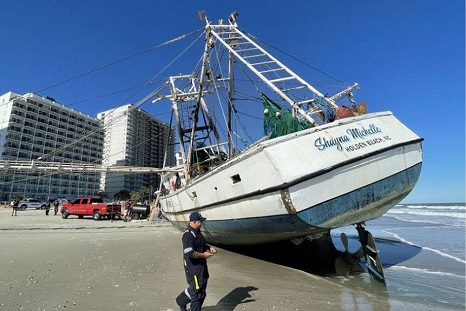
It takes a village: Owner of F/V Shayna Michelle stuck on beach talks about rescue efforts
The Coast Guard was called in to rescue the four-man crew after they anchored down about two miles off the coast of Myrtle Beach.”We expect it to end up on the beach, but there’s also possibilities of pumps and other things quitting, causing the boat to sink. It gets you nervous there,” Aaron Robinson, owner of the Shayna Michelle, said. The anchor line snapped during the storm, and eventually, the boat washed up on shore. Robinson said the tiring effort to get his boat back in the water was something that could only happen with dedication and lifelong friendships. The Varnam family played a big role in orchestrating the effort, along with many other locals that had the resources, manpower, and knowledge needed to make this successful. Thousands of pounds of rope and a couple of excavators made it happen. >click to read< 08:53


































